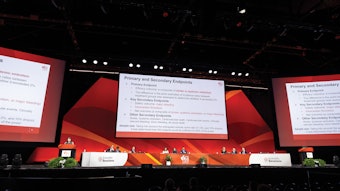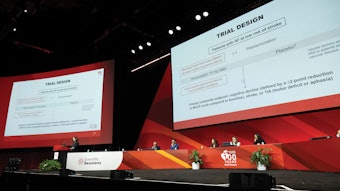Q&A: Research Goes Red recognition
Silvi Shah, MD, MS, will receive this year’s award honoring Dr. Nanette K. Wenger.

In 2021, the American Heart Association established the Dr. Nanette K. Wenger Research Goes Red Award. The accolade, sponsored by the AHA’s Research Goes Red initiative, recognizes the best scientific article on cardiovascular disease and stroke in women that was published in an AHA journal.
Silvi Shah, MD, MS, is this year’s recipient of the award, and she will present her article Saturday morning at Scientific Sessions. Shah is an associate professor in the Division of Nephrology and Hypertension at the University of Cincinnati College of Medicine.
Scientific Sessions Daily News spoke with Shah to learn more about her background, research and award-winning article, “Sex Differences in Cardiovascular Outcomes in Patients With Kidney Failure,” which was published in May in the Journal of the American Heart Association. The study was funded by a K23 career development award that Shah received from the National Institutes of Health.
Q. Congratulations on winning the Dr. Nanette K. Wenger Research Goes Red Award. What is the theme of your article, and what are some of the highlights that you will present during the session?
Shah: Our study looked at sex differences in cardiovascular outcomes in patients with kidney failure who were receiving dialysis. Interestingly, we show that women, as compared to men, have a 14% higher risk of cardiovascular events, 16% higher risk of heart failure, 31% higher risk of stroke and no difference in risk of acute coronary syndrome. Our study is one of the first studies, to the best of our knowledge, to examine and report a higher risk of cardiovascular events in women among patients with kidney failure.
Q. Was there a specific experience or encounter that drove this investigation?
Shah: Cardiovascular disease remains the leading cause of death in patients with kidney disease. Also, the risk of cardiovascular events is 10 to 20 times higher in patients with kidney failure as compared to the general population. I saw a 50-year-old female patient who had a history of kidney failure and was receiving hemodialysis at Cleveland Clinic. While evaluating her for possible transplantation, she asked how her cardiovascular risk differs by sex. Although sex differences in cardiovascular disease are well described in the general population, little is known about this among patients with kidney failure, which drove the initiation of the study.
Q. How can the study’s findings be implemented to improve patient care and outcomes?
Shah: Our study shows among patients with kidney failure receiving dialysis, women have higher rates of cardiovascular events, heart failure and stroke as compared with men. Among patients with kidney failure receiving dialysis, women have a lower risk of cardiovascular mortality and all-cause mortality as compared to men. Our findings suggest improving efforts for the prevention of cardiovascular disease and health promotion by taking sex into account among patients with kidney failure.
Q. What is the importance of this research?
Shah: Cardiovascular disease is the leading cause of death in women, and critical knowledge gaps continue to exist about women’s cardiovascular health, including sex differences in cardiovascular disease burden among patients receiving dialysis. Due to the high morbidity and mortality of cardiovascular disease in women and the paucity of data, the Research Goes Red initiative is essential.
Q. Can you share about your background and how you got to this stage in your career?
Shah: I am a tenured associate professor and an NIH-funded physician-scientist in the Division of Nephrology at the University of Cincinnati, Ohio. I completed a general nephrology fellowship from the Cleveland Clinic Foundation, a transplant nephrology fellowship at the University of Alabama at Birmingham, and a master's in clinical and translation research from the University of Cincinnati. My research focuses on women’s health, including sex disparities, health equity and cardiovascular health with kidney disease.
I am also the chair for the American Heart Association’s Kidney in Cardiovascular Disease SCILL (Scientific & Clinical Education Lifelong Learning) Committee, and I lead the American Society of Nephrology’s Women’s Health and Research in Nephrology community.











